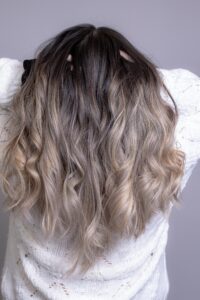Beautifying Tresses Naturally: Unraveling the Potency of Essential Oils for Hair
Using essential oils for hair adds a pleasant scent to your mane. Not only that it is very beneficial in many ways. Imagine that heavenly smell of essential oils for hair in your tresses every day. Imagine for a second that you’re walking through a lavender field. Do you know that distinct floral aroma that fills your nose?
Okay, please pull up a chair, and let’s chat about essential oils. They are naturally occurring, volatile aromatic compounds found in the seeds, bark, stems, roots, flowers, and other parts of plants. They’re pure, highly concentrated and, let’s be real here, they smell like heaven on earth. That’s the essence, aka essential oils, from the plant.
Unveiling the Connection of Essential Oils and Hair Care
Now, we’re living in the ultimate do-it-yourself era, aren’t we? Essential oils have been a popular trend in the natural beauty world, and it’s not hard to understand why. When it comes to hair care, they’ve got such a grand show on the stage with star-studded benefits like promoting hair growth, improving scalp health, and enhancing the overall look and feel of our beloved tresses.
Popular Myths vs. Established Facts
Trust me, it’s not all rainbows and unicorns. There’s a fine line between facts and fiction in the world of essential oils. Some say these golden drops can turn a bald head into a hippie’s hairdo overnight, however, though certain oils can enhance hair growth and thickness, they can’t produce hair follicles where none existed before.
Unpacking the Benefits
Nurturing Hair Growth with Essential Oils
Can essential oils make your hair grow faster? Yes, and no – it’s not a Harry Potter magic spell, but when used correctly, they can create an environment that nurtures your existing hair and follicles. Several essential oils are known to keep your hair follicles happy, reduce inflammation, and increase blood flow, helping to stimulate growth.

Essential Oils for Scalp Health: Dandruff and Dryness Resolution
Nobody likes a flaky, itchy scalp, or the desert-like dryness that often comes with it. Essential oils with antifungal, antibacterial, and soothing properties can be a real game-changer for dandruff and scalp dryness.
Essential Oils for Boosting Hair Shine, Volume, and Thickness
Remember Diana Ross and her larger-than-life hair? Imagine having that kind of volume! Some essential oils can add shine, volume, and thickness to your hair, helping you step out in style. Essential oils are a must-have in your everyday lineup!
The Lineup: Top Essential Oils Used in Hair Care
Lavender Oil: Promoting Hair Growth and Reducing Stress
Lavender oil has a high-shine role in hair care. Early research indicates it can enhance hair growth while acting as a stress-buster. And let’s be clear, in a world – where stress levels are often higher than my living room’s ceiling fan, that’s a pretty darn nice advantage.
Rosemary Oil: Stimulating Blood Circulation for Hair Follicles
Rosemary oil is like the Beyoncé of essential oils for hair care – always in the spotlight and for a good reason. It stimulates blood flow when massaged into the scalp, awakening those sleepy head follicles.
Tea Tree Oil: Alleviating Common Scalp Conditions
You know how you always have that one friend who is the problem solver in a crisis? That’s tea tree oil in the essential oil crowd. From fighting against pesky dandruff to dealing with that unwelcome itchy scalp, this guy’s got your back.
Practical Guide: Correct Application and Use of Essential Oils
Best Practices for Applying Essential Oils on Hair and Scalp
Just like you don’t pile your plate sky-high on a buffet, don’t go heavy on oils for hair. A little goes a long way. For most hair care applications, a few droplets mixed with a carrier oil (like jojoba or coconut oil) will do the trick.

Identifying the Right Oil Combination for Different Hair Types
Choosing the right type of oil for your hair is a bit like dating. You want a partner that complements your style, not one that upstages you or causes friction. Figure out whether your hair is dry, oily, or normal, and aim for an oil that speaks to your hair’s unique needs and interests. Dry hair benefits an all-over application, oily hair might just need it on the ends of the hair.
Safety Precautions: Avoiding Overuse and Allergic Reactions
Always do a small patch test on your skin before slathering your scalp with essential oils. Remember — everyone’s body is unique, and not all essential oils play well with everyone.
Store-Bought vs. DIY: Essential Oils Infused Hair Products
Commercially Available Hair Products with Essential Oils
There are numerous hair care products on the market enriched with essential oils – shampoos, conditioners, hair masks, you name it. These can be a great starting point if you’re a newbie to the essential oil world.
Homemade Solutions: Creating DIY Essential Oil Hair Treatments
If you’re more the DIY type, mixing your concoctions can be the way to go. It gives you full control over what you’re putting on your head, minus the fillers and preservatives.
Dispelling Misconceptions: Pros and Cons of Both Approaches
There’s no definitive epic battle between the store-bought vs. DIY approaches. Both have their pros and cons and what’s essential is finding an approach that suits you and your busy schedule (or lack thereof). I like to make my own blends with oils and pure coconut oil. That way I know exactly what’s in it. Just add several drops of your essential oil to coconut oil and apply as needed.

Harnessing the Natural Power of Essential Oils for Hair
In a nutshell, essential oils can be powerful players in your hair care team. They’ve got potential. They’ve got spunk. All they need is a little understanding and correct use to help you rock your locks. Experiment with the different oils, you can even combine them.
Just make sure to never apply them without diluting them first in carrier oil. My favorite is coconut. You can also add a few drops of oils that you simply enjoy the scent of. I love adding some lemon or bergamot along with medicinal oils to the mix for a more pleasant fragrance. If you would like to learn more about using essential oils here is an article on allergy relief with them…
Frequently Asked Questions
Yes, you can, but remember, less is more. A little can go a long way, and overuse can be counterproductive.
Like anything potent, misusing essential oils may lead to irritations or allergies, hence those patch tests. Always respect your product and follow the recommended guidelines.
Patience is a virtue, darling. Noticeable changes can take weeks or a few months, depending on the individual. But trust me, good things come to those who wait.


